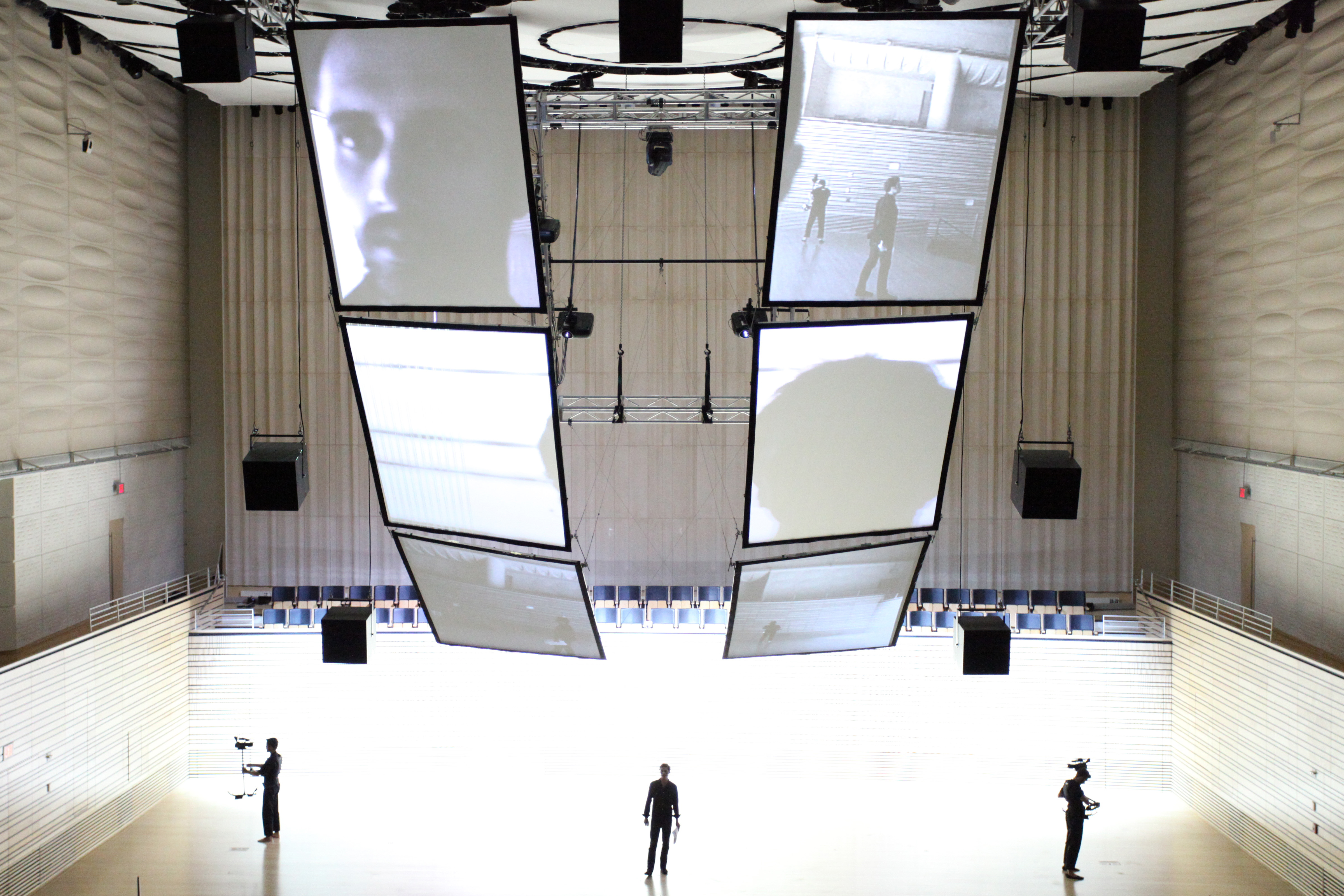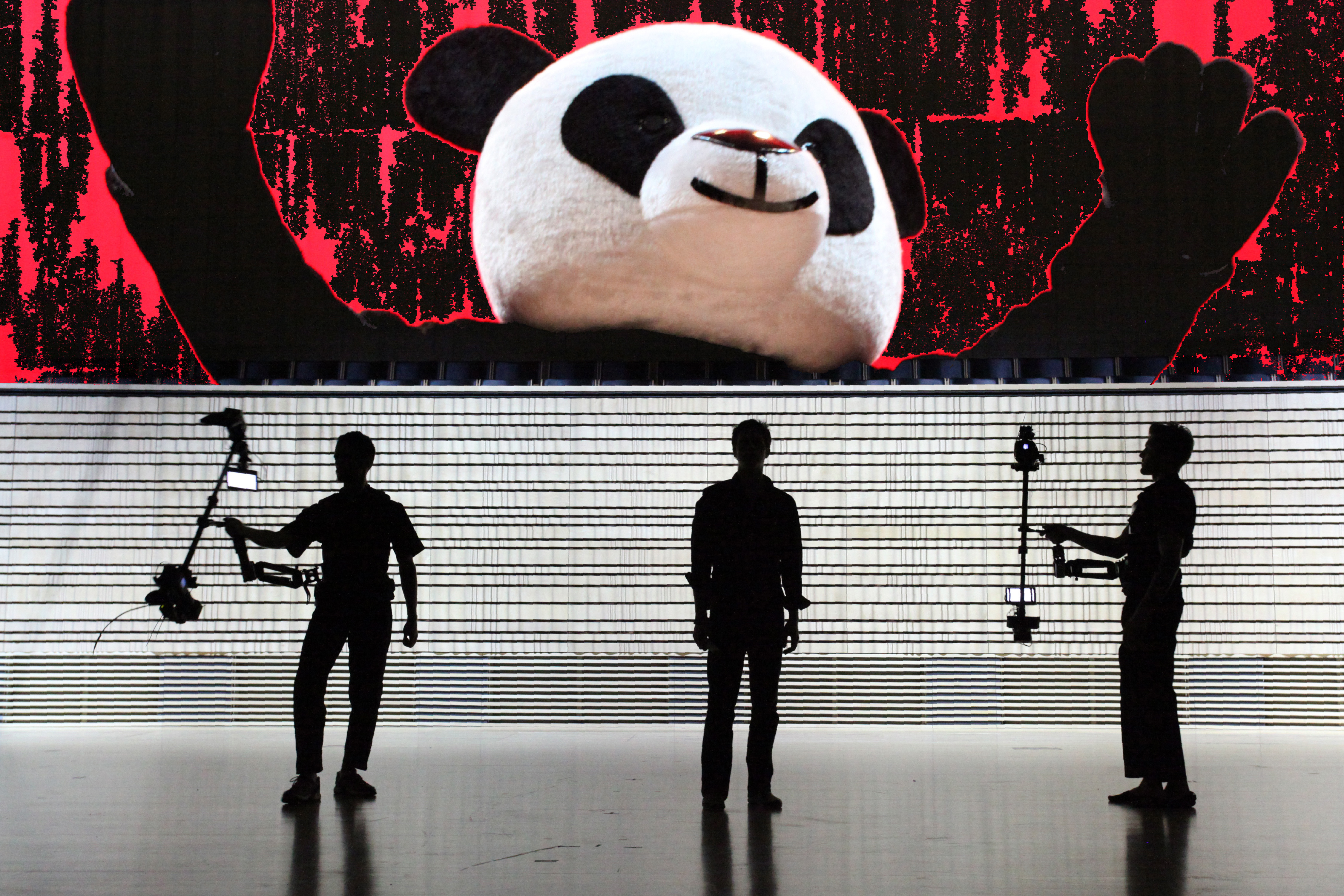Lars Jan, a TED Fellow, creates multimedia performances that probe the ubiquity of screens and propaganda in our culture. Today, his show ABACUS—billed as “a multimedia talking tour of our hyper-networked world to come”—opens at BAM’s Fisher Fishman Space in Brooklyn, New York. It’s a show delivered by his invented persona, Paul Abacus, about the future of national borders and the workings of contemporary persuasion—with a giant panda appearing overhead on occasion. It’s a show that Jan first gave a sneak peek of back at TEDGlobal 2011. Below, the edited transcript of a conversation we had with Jan about his work at the time.
Tell us more about ABACUS.
I want ABACUS to start a conversation about our relationship to screens and about how, in our culture, propaganda wins over content so much of the time. It’s a very visual, sixty-minute direct address to the audience. One of the big things that ABACUS is about is increasing visual literacy, so that people are better able to discern good content from bad — and truths from fiction or propaganda — more easily.
We performed ABACUS at the Sundance Film Festival in 2012, as part of New Frontier, and we launched a successful Kickstarter campaign for it as well. We did some public performances on the streets, some choreographed paparazzi, and some impromptu press conferences and choreographed protests, which were also part of the piece.
A lot of your work explores our screen-based culture. How did you become obsessed with this theme?
I think it came on slowly. I am an only child, raised by my mom, and like a lot of kids growing up in America, I watched a lot of television. I was also part of that generation where personal computers first came into the home.
Technology, computing, and screens are completely central to my work. I’m ambivalently obsessed with screens: I love how democratic they are, in the sense that they allow all this information, and intelligent, aesthetic vision to travel the map in no time. At the same time, I’m very curious about screens as they relate to how we gather, and relate to live events.
Ever since cinema was introduced, screens have been kicking the teeth in of live performances. And I think that there’s something that has been a little bit lost because of this. Screens encourage people to stay in, and screens encourage people to look at an object in a public space as opposed to another person. The pendulum is swinging so far in favor of the screen, and it’s going to swing even further. Screens are going to be all over our public and private spaces, mapped onto cars, trees, architecture. Futurists talk about embedding them into contact lenses.
Unfortunately screens have become primarily created in the service of advertising. Executives want television shows to be good so that they can sell the advertising slots for more money. And now the same thing is happening on my cell phone and on the Internet.
I think it’s a really impoverished way of thinking about what’s possible with screen space, and what we could do with it educationally, culturally, and communicatively — in terms of encouraging diversity of aesthetic experiences, but also in terms of encouraging something that is closer to what a true democracy might look like. I think screens could be integral to that. But because of the direction screens are currently heading, I think live events and live gatherings are going to emerge as incredibly important in the next decade.
Above: A trailer for ABACUS, created for the Sundance Film Festival.
In promoting a renaissance of live performance, do you hope to see the prevalence of screens decrease?
It sounds like I’m damning screen culture or something, but I’m not. I love screens. Screens are in my work. Technology is in my work. Our lives have so much to do with that relationship. In the way that you would inoculate somebody with a vaccine by taking in a small amount of the virus into your body, in my work, screens are sort of like the vaccination. I use screens in order to put performers and the audience in relationship to the screen. It enables a very active dialogue that’s not formally about screens, but that somehow makes that relationship resonate with whatever the content is. It allows us to meditate on that very contemporary experience.
There’s a lot that’s happening in our culture right now that the screen-based media is not able to critique, because it’s working at the service of a lot of people who are actually causing the problems. I think working from the artistic and the financial fringe is the only real way to keep a separation between something like advertising or a corporate interest, and real artistic freedom. I believe the live event is a platform for artists to have a much higher level of true conversation within society.
You have a pretty strong stance on the ways you will fund your art. How do you manage to do it?
Well, I lie, cheat and steal. [Laughs]
The problem is, there’s not a single pathway. It’s always an improvisation. Being an artist in this culture, you have to use a tremendous amount of your creativity just to find a way to do your work with integrity. That means producing your work and aligning yourself with institutions, supporters, and festivals that you respect. It’s also about finding a way to bend what I’m interested in to the contexts that are available. It’s about jumping on those opportunities, and looking at them as interesting platforms that I didn’t necessarily conceive of in the first place.
There are many aspiring social entrepreneurs out there who are trying to take their passion and ideas to the next level. What one piece of advice would you give them, based on your own experience and successes?
Anybody focused on increasing the quality of face-to-face human interaction is going to be riding a growing wave in the next couple of decades. Do everything you can to increase true face-to-face encounters and the quality of those interactions — whether it’s investing in community programs or international exchanges, in rethinking public space or public transportation. People are going to be hungry for that social contact, in order to counterbalance our increasingly mediated lives. Leverage that trend. I believe it’s going to be a very profound one, and will apply to a lot of different businesses.
You’ve said that before realizing you were an artist, you dedicated yourself to more conventional ways of working for social causes. When was the moment you realized you were an artist?
I took a directing class in college, and that was the first moment I realized I was able to collage a lot of different things I was interested in. I made a piece in the class where I integrated some short clips of videos from La Dolce Vita, which is one of my favorite movies, some poetry from Paradise Lost, which is one of my favorite works of literature, played with light in the classroom, and I performed a bit myself.
I don’t think I knew what I was doing, but I think I became aware that there was an impulse that was guiding choices I didn’t know why I was making. I think the moment that I realized I could stop making “logical” choices and just make instinctual choices, was when it occurred to me, “Oh, maybe that’s what it means to feel like you are inspired.”
That type of work made me so much happier than writing a paper or constructing an argument with three bullet points. I think what I recognized was that even though I love language and I love ideas, I feel like the way that we structure most of our arguments is far too literal. With my art I am able to express feelings in a way that is both more vague, and simultaneously more specific.

ABACUS, peformed at The Experimental Media & Performing Arts Center in Troy, NY. Photo: Lars Jan
What other pieces can we look forward to seeing from you?
I am working on a dance video installation with Nichole Canuso Dance Company. It’s called “Takes.” It’s a really beautiful dance video installation, very emotionally and visually driven, with no language.
The art lab I direct, Early Morning Opera, also just signed on with a new producer, MAPP International Productions, for a piece that I’m deeply excited about called HOLOSCENES, which is about global rituals. The name is a play on the current geologic epic that we’re in, the Holocene. We’re making a computer program that generates 24 random land-based GPS coordinates, and we’ll research rituals starting as close to those 24 points as possible.
The work is going to be a big outdoor installation in three giant acrylic aquariums. A custom hydraulic system will modulate the level of the water in the aquariums, according to environmental conditions around the world, in real time. It plays on the theme of popular water spectacles — the fountains in front of the Bellagio, for example — but primarily, the piece is about flooding. It’s about global catastrophe, the persistence of human behavior, and habits in the face of larger systems. It’s about our inability to change quickly — something that is both really gorgeous and so frustrating at the same time. (Read more about how Holoscenes is progressing. It was funded via Kickstarter in June of 2014.)
Why is being part of the TED Fellow community important to you?
The thing that’s most exciting to me about the TED Fellowship is communicating and working with creative people. I don’t really care if they are in “artistic fields” or not. The abiding commonality of TED Fellows is that whatever they do — if they’re astronomers or doctors or in some research field — they are just incredibly, hellaciously creative. The TED Fellowship has been the single group that I’ve been most proud to be a part of. They are truly smart, inspiring people.
America into the 20th century was really about specialization, and I think we became overspecialized. That hinders vocabulary exchange. It makes certain things too complicated and opaque for other groups to understand and have a dialogue about. The finance system is a very good example of that. Systems have gotten so byzantine that only a few people know how to navigate them or even talk about them. I love being part of a community where a person like a TED Fellow who’s doing very, very complicated work in biotech, for example, makes it a point to communicate in a compelling way to people who don’t have that expertise.
Above: A look at HOLOSCENES.
Note: This piece was originally published on Nov. 4, 2011. It was updated on September 24, 2014, as ABACUS opened at BAM.

Comments